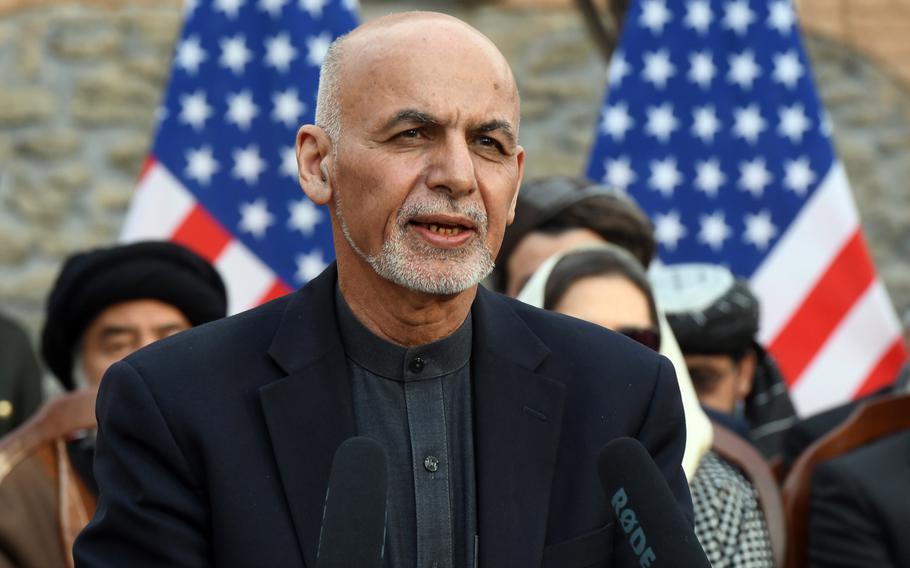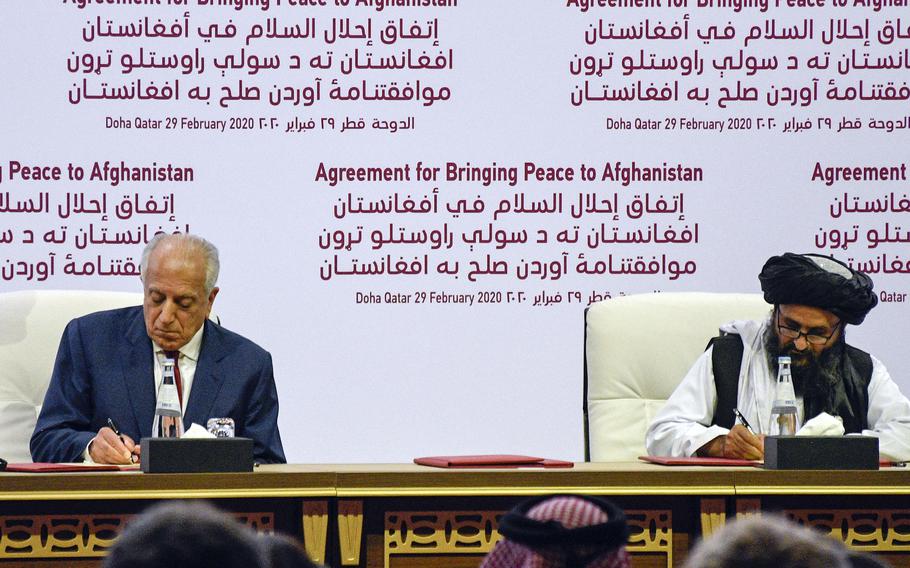
Former Afghan President Ashraf Ghani speaks at a ceremony in Kabul on Saturday, Feb. 29, 2020, saying the government is ready for talks with the Taliban. The Special Inspector General for Afghanistan Reconstruction issued a report Nov. 17, 2022, that said peace talks with the Taliban that excluded the U.S.-backed Afghan government proved to be a key factor in the rapid collapse of Ghani’s administration last year. (Phillip Walter Wellman/Stars and Stripes)
The Trump administration’s exclusion of the U.S.-backed Afghan government in peace talks with the Taliban proved to be a key factor in its rapid collapse last year, according to a withering new report by a federal watchdog issued Thursday.
The Special Inspector General for Afghanistan Reconstruction report came in response to a call from Congress for analysis of why the Afghan government fell so quickly despite two decades of American investment to prop up democratic rule there.
“U.S. efforts to build and sustain Afghanistan’s governing institutions were a total, epic, predestined failure, on par with the same efforts and outcome in the Vietnam war, and for the same reasons,” Chris Mason, associate professor of national security at the Army War College, said in the report.
The 2020 deal the U.S. negotiated with the Taliban under former President Donald Trump that traded American withdrawal for vague anti-terrorism commitments emboldened the militant group, the report said.
“Just talking to the Taliban alone and excluding our allies proved the Taliban’s point: The Afghan government were our puppets, you didn’t need to talk to them,” Hugo Llorens, former U.S. special charge d’affaires for Afghanistan, said in the report.

Zalmay Khalilzad, the American special envoy for Afghan reconciliation, signs a peace deal alongside the Taliban’s Mullah Abdul Ghani Baradar in Doha, Qatar, on Feb. 29, 2020. (J.P. Lawrence/Stars and Stripes)
The U.S. made crucial errors in both the foundational stages of the war and the final critical years, analysts found.
Spending $145 billion on reconstruction and developing the Afghan government failed to turn the country away from the Taliban, experts wrote.
“Building latrines does not make you love Ashraf Ghani,” who was Afghan president when the U.S.-backed government fell, said Scott Guggenheim, a former senior adviser to Ghani.
In addition, American politicians gave conflicting information to the Afghan government about whether the U.S. actually intended to leave, according to the report.
Afghan officials chose to listen only to those “who were giving them more optimistic scenarios,” said Laurel Miller, former acting special representative for Afghanistan and Pakistan.
Other factors included the overly centralized Afghan government’s high levels of corruption and overestimation of its ability to hold off the Taliban, the report said.
However, U.S. efforts did lead to some progress in gains in health and education as well as societal development for Afghans, the report said. Some ministries of the old government persist under Taliban rule.
The Taliban deposed the Ghani government in the midst of the withdrawal of U.S. forces, creating a frantic scramble to evacuate both American and Afghan civilians from the hard-liners’ clutches.
Afghanistan now faces a grim situation, with Taliban repression exacerbating a humanitarian crisis that has left much of the population starving.